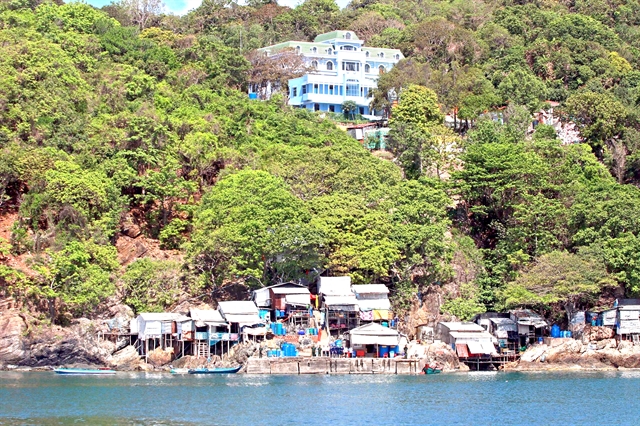 Society
Society

 |
| Hòn Chuối is home to hundreds of families who rely mainly on fishing and aquaculture. — Photo thanhnien.vn |
CÀ MAU — Seventeen nautical miles off the coast of Cà Mau Province, Hòn Chuối Island is remote and rugged, home to hundreds of families tied to the sea. Many rely on cobia fish cage farming, a trade that brings hope but also hardship.
“The fish grow well and fetch high prices, but our biggest challenge is still capital and technique,” fisherman Lê Ngọc Quang of Sông Đốc Commune told Thanh Niên (Youth) newspaper.
Hòn Chuối is more than a fishing village. Along with Hòn Khoai, the island forms part of Việt Nam’s southernmost defensive line, a living landmark anchoring sovereignty in the southwestern sea.
Its waters are both a rich fishing ground and a vital maritime route connecting Việt Nam to the Gulf of Thailand. For thousands of boats, the island is both a protector and a point of return.
Promise and pressure
Beyond its role in national defence, Hòn Chuối carries significant economic promise. Local authorities see it as a potential hub for fisheries logistics, maritime services and eco-tourism.
Cobia cage farming already provides income for many households, but limited loans, training and disease control keep operations small and vulnerable.
“Marine farming can become a spearhead industry,” said Phạm Văn Mười, deputy director of Cà Mau’s Department of Agriculture and Environment. “But it must be sustainably zoned, technically sound and environmentally friendly.”
If managed well, aquaculture could anchor support services, create jobs and provide long-term stability for the island community.
While livelihoods grow above the water, the hidden wealth below is under strain.
A recent survey recorded healthy coral patches still circling Hòn Chuối Island, providing shelter for countless marine species. Yet overfishing and environmental stress are eroding fish stocks and threatening reef resilience.
Scientists warn that without protection, reefs may degrade, undermining both biodiversity and the resources islanders depend on.
Coral reefs are more than marine wonders. They shield coastlines, balance ecosystems and attract eco-tourism. Their survival is tied directly to the island’s future.
Local authorities and conservation groups are now working to balance economic growth with ecological protection. Plans include zoning aquaculture areas, introducing eco-friendly practices and establishing long-term monitoring of coral ecosystems.
The vision is for Hòn Chuối to produce clean seafood while maintaining the biodiversity that sustains it. If successful, the island could become a model for combining aquaculture, conservation and eco-tourism – a rare example of livelihoods and nature thriving together.
With cliffs that rise nearly 170m above the waves and paths that snake precariously along rocky slopes, the island remains a tough place to live. But for those who call it home, Hòn Chuối is more than rugged terrain. It is a lifeline.
"To effectively tap the potential of Hòn Chuối, the joint effort of authorities, scientists and fishing communities is essential. The goal is to both develop the economy and preserve the marine ecosystem – a vital element for the island’s future," Mười said. — VNS




